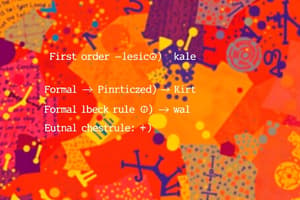Podcast
Questions and Answers
What is the primary focus of informal logic?
What is the primary focus of informal logic?
- Analyzing mathematical proofs
- Using symbols to represent arguments
- Studying the structure of statements
- Examining reasoning in everyday language (correct)
Which of the following defines a valid argument?
Which of the following defines a valid argument?
- The argument contains no fallacies
- The premises are true and the conclusion is false
- The conclusion logically follows from the premises (correct)
- All premises and the conclusion are false
What does the logical connective 'AND' represent?
What does the logical connective 'AND' represent?
- True unless a true premise leads to a false conclusion
- True only if both propositions are true (correct)
- True if at least one proposition is true
- Inverts the truth value of a proposition
Which of these fallacies involves attacking the character of the individual instead of addressing the argument?
Which of these fallacies involves attacking the character of the individual instead of addressing the argument?
Which figure is primarily credited with the development of modern predicate logic?
Which figure is primarily credited with the development of modern predicate logic?
What is a characteristic of a sound argument?
What is a characteristic of a sound argument?
How does logic apply to mathematics?
How does logic apply to mathematics?
What is the truth value of an implication that is true unless a true premise leads to a false conclusion?
What is the truth value of an implication that is true unless a true premise leads to a false conclusion?
Flashcards are hidden until you start studying
Study Notes
Definition of Logic
- Logic is the systematic study of valid inference and correct reasoning.
- It is concerned with the principles of valid arguments and the structure of statements.
Types of Logic
-
Formal Logic
- Deals with the form of arguments.
- Uses symbols and structured formulas.
- Includes propositional logic and predicate logic.
-
Informal Logic
- Focuses on natural language arguments.
- Analyzes reasoning in everyday contexts.
- Addresses fallacies and the strength of arguments.
Key Concepts
- Propositions: Statements that can be true or false (e.g., "It is raining").
- Arguments: A set of propositions, where some (premises) support another (conclusion).
- Validity: An argument is valid if the conclusion logically follows from the premises.
- Soundness: An argument is sound if it is valid and its premises are true.
Logical Connectives
- AND (Conjunction): True if both propositions are true.
- OR (Disjunction): True if at least one proposition is true.
- NOT (Negation): Inverts the truth value of a proposition.
- IF...THEN (Implication): True unless a true premise leads to a false conclusion.
- IF AND ONLY IF (Biconditional): True when both propositions have the same truth value.
Fallacies
- Ad Hominem: Attacking the person instead of the argument.
- Straw Man: Misrepresenting an argument to make it easier to attack.
- Slippery Slope: Arguing that a small step will lead to a chain of related events.
- Appeal to Authority: Claiming something is true because an authority figure says so.
Applications of Logic
- Critical Thinking: Enhances reasoning skills and the ability to evaluate arguments.
- Mathematics: Forms the foundation of mathematical proofs and problem-solving.
- Computer Science: Underlies algorithms, programming languages, and artificial intelligence.
Important Figures
- Aristotle: Established syllogistic logic and formal systems.
- Gottlob Frege: Developed modern predicate logic.
- Bertrand Russell: Contributed to the foundations of logic and analytic philosophy.
- Ludwig Wittgenstein: Explored the relationship between language and logic.
Conclusion
- Logic is essential for structured thinking and effective communication.
- Understanding the principles of logic aids in recognizing strong versus weak arguments.
Definition of Logic
- Systematic study focused on valid inference and reasoning.
- Highlights principles governing valid arguments and statement structures.
Types of Logic
-
Formal Logic:
- Emphasizes argument structure over content.
- Utilizes symbols and structured formulas.
- Encompasses propositional and predicate logic.
-
Informal Logic:
- Concentrates on natural language arguments.
- Evaluates reasoning in daily contexts.
- Addresses argument strengths and fallacies.
Key Concepts
- Propositions: Can be assigned true or false values (e.g., "It is raining").
- Arguments: Comprises premises that support a conclusion.
- Validity: An argument is valid if the conclusion logically follows from the premises.
- Soundness: A sound argument is both valid and has true premises.
Logical Connectives
- AND (Conjunction): True only if both propositions are true.
- OR (Disjunction): True if at least one proposition is true.
- NOT (Negation): Flips the truth value of a proposition.
- IF...THEN (Implication): True unless a true premise results in a false conclusion.
- IF AND ONLY IF (Biconditional): True when both propositions share the same truth value.
Fallacies
- Ad Hominem: Attacks the individual rather than the argument.
- Straw Man: Distorts an argument, making it easier to refute.
- Slippery Slope: Suggests minor actions lead to significant and undesirable outcomes.
- Appeal to Authority: Bypasses logic, relying on authority figures to claim truth.
Applications of Logic
- Critical Thinking: Strengthens reasoning capabilities and argument evaluation.
- Mathematics: Serves as the basis for proofs and problem-solving.
- Computer Science: Integral to algorithms, programming languages, and AI development.
Important Figures
- Aristotle: Pioneer in syllogistic logic and formal systems.
- Gottlob Frege: Innovator of modern predicate logic.
- Bertrand Russell: Key contributor to logic foundations and analytic philosophy.
- Ludwig Wittgenstein: Investigated the connections between language and logic.
Conclusion
- Logic is vital for coherent thinking and effective communication.
- Understanding logic principles enhances the ability to differentiate strong and weak arguments.
Studying That Suits You
Use AI to generate personalized quizzes and flashcards to suit your learning preferences.




